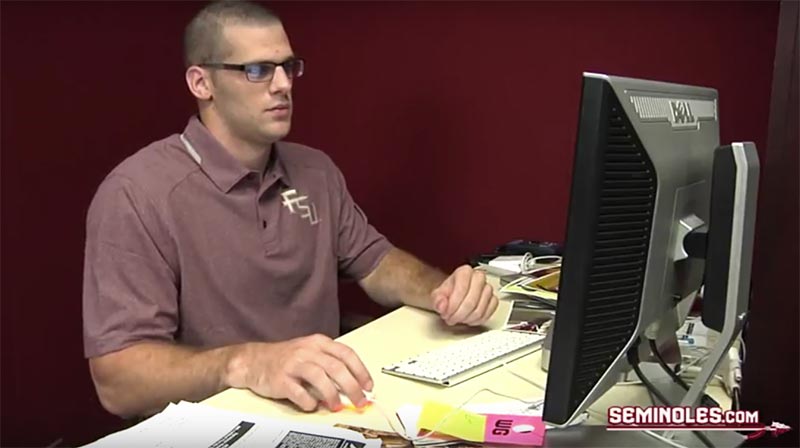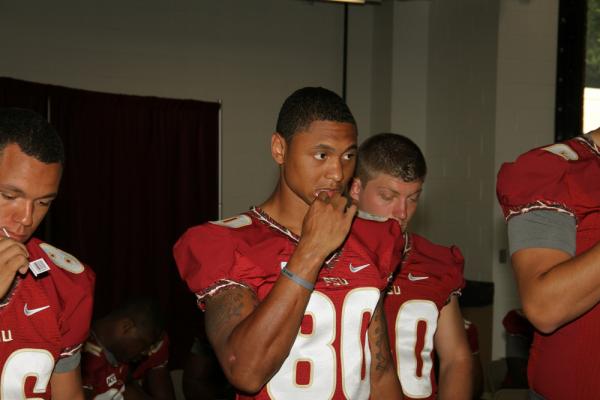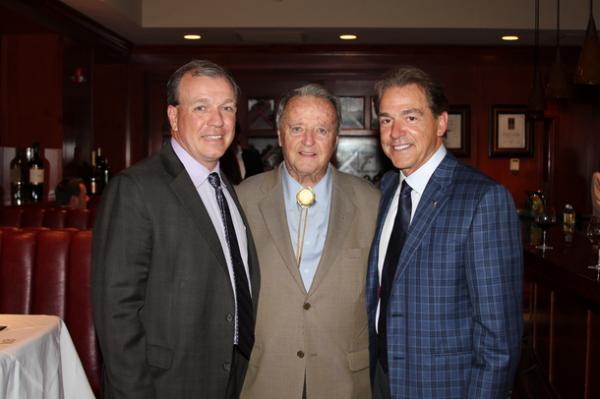Florida State’s Jimbo Fisher, Virginia’s Mike London connected by rare disease called Fanconi anemia
November 18, 2011
By Steve Yanda
Tallahassee — In the moments after Candi Fisher got the phone call with the diagnosis, the spaghetti she had been cooking for dinner became unimportant. So she left it on the stove, hopped into her car and drove a few blocks to a path that led into the woods. Out of the car and into the dusk, she ran, barefoot, crying and screaming her husband’s name.
Jimbo Fisher, the Florida State football coach, was driving their two sons around a pond in a golf cart when he heard his wife’s voice. Seventeen days earlier, their youngest boy, 6-year-old Ethan, had been tested for a rare blood disorder, and Jimbo knew the results were due back soon.
“It’s positive?” he asked his wife.
“Yeah,” she said.
More than 4.2 million births occur each year in the United States; roughly 31 of those children are born with Fanconi anemia, a blood disease that slowly, stealthily causes bone marrow failure. There is no known cure, and doctors estimate it will be three to five years before Ethan’s body is ready for a bone marrow transplant.
On Saturday night, Jimbo Fisher will lead his Seminoles against a Virginia team coached by Mike London. Eleven years ago, doctors discovered that London’s daughter, Ticynn, had Fanconi anemia. That two families with fathers in such an exclusive profession — and in the same conference, no less — could be struck by the same unusual affliction is remarkable.
That one of them has come through the harrowing experience successfully offers hope to the other. Ticynn London celebrated her 16th birthday this month.
Ethan Fisher and his family, meantime, remain in a torturous waiting period that began on that Monday in late March.
“You feel like everything can be cured, everything can be treated,” Candi Fisher said. “As a parent, you don’t ever want to let your mind go to ‘There actually is something that could happen to my child that can’t be fixed.’ And then when you hear that’s a possibility, it’s kind of like the rug’s pulled out from under your feet, and you’re in quicksand.”
Constant worries
Regina London lived in that quicksand for more than three years, its effects evident from the outset. At first her trepidation was confined to her oldest daughter, Ticynn, who was discovered to have Fanconi anemia in January 2000.
An inherited disease, Fanconi anemia eventually leads to bone marrow failure. When that occurs, the body stops producing the number of blood cells it needs to survive. And so Regina learned to be vigilant in monitoring Ticynn’s every move, for the slightest bruise, infection or illness could be the one that overwhelmed her daughter’s blood regulatory system.
Five weeks after the diagnosis, after a search of the national bone marrow registry came up empty, Regina learned her husband, Mike, then an assistant at Boston College, was nearly a perfect match for Ticynn. The Londons were told at the time that the odds of an African American parent being a suitable bone marrow donor for his or her child is 10,000 to 1. Mike London was the one.
As exhilarating as that news was, it also doubled Regina’s fretfulness.
“We knew that Mike was going to be the donor for her, but if something happened to Mike, we didn’t know where we would be,” Regina said. “And he traveled all the time for recruiting. If he got in a car accident . . .”
Regina asked Ticynn’s doctors if, in the event Mike did get into a car wreck, they could keep him alive long enough to extract his bone marrow.
The doctors “looked at me like I was crazy, and I was like: ‘No, you don’t understand. This is her life. If something were to happen to him, then that ruins her chances,’ ” Regina said. “If he got sick or if he developed anything, then that would ruin her chances. I said it in a jokingly way, but I was serious.
“Mike said, ‘Why did you take it all the way there?’ I had to. ‘What happens if something happens to you? Where would we stand?’ ”
The doctors never answered Regina’s question, but from that moment forward, Mike said, he was hyper-cautious in his actions. Whenever he needed to shave in the coaches’ locker room, he used a new razor, lest he accidentally pick up someone else’s. When he got in his car, he put his seat belt on before turning the ignition.
Ticynn seemed to best handle the waiting for a bone marrow transplant. Other than displaying occasional lethargy, she acted like any other kid during those three years. That is Fanconi anemia’s cruelest side effect: Everything seems normal.
“The most anxious moments are always the moments when you go take her to the doctor and have them draw blood to see where her counts are,” Mike said. “You’re hoping deep, deep down inside that some miraculous miracle will occur and those numbers will shoot back up and that they would say: ‘You know what? She’s fine now.’
“But the reality of it is her numbers were at a level that said she was okay, and we decided to have the transplant when she was at a level that said she was okay, rather than [waiting for her blood counts to plummet] and then try to do it. The timing of everything worked out.”
On April 29, 2003, Mike London, who by then was an assistant at Virginia, donated his bone marrow to try to save his 7-year-old daughter’s life.
It worked. Ticynn London just finished volleyball season at St. Anne’s Belfield School in Charlottesville.
A normal 6-year-old
Had Fanconi anemia not become a facet of her everyday life, Candi Fisher would struggle to discern the difference between her youngest boy, Ethan, and every other 6-year-old she has encountered.
One Thursday morning in mid-October, Ethan got off to a rough start. Candi has learned that her son starts to wear out toward the end of the week, and on that day, Ethan had decided he didn’t want to go to school. A tantrum ensued.
Consequently, Candi arrived a few minutes late to a board meeting for the nonprofit charitable foundation she and Jimbo started in August after deciding to take their fight against the disease public. They called it the Kidz 1st Fund, and in two months it raised more than $425,000 for Fanconi anemia treatment research.
Later that afternoon, Candi picked up older son Trey, 10, and Ethan from school. When they arrived home, the boys munched on some Halloween candy, and then Ethan grabbed his baseball glove and a foam ball. He started throwing the ball from the living room at a hallway wall. He used to play organized baseball, but not anymore.
“First I’ve got to warm up,” Ethan said, “and then I just throw fast.”
He estimated he could throw that foam ball 99 mph, and the whap! whap! whap! sound the ball made against the wall seemed to provide enough confirmation.
That evening, Trey went to baseball practice while Candi and Ethan paid a visit to the Florida State marching band. The Marching Chiefs — all 460 of them — had agreed to join the national bone marrow registry, though that didn’t impress Ethan. He wanted to watch the end of Jimbo’s football practice on an adjacent field.
When Ethan finally got there, he was so intent on finding a football to toss around that he missed seeing his father as the coach came off the field. By the time he got back in Candi’s car to go pick up Trey, Ethan had moved past his disappointment. He slipped, instead, into the stream of consciousness of a perfectly fine and happy little boy.
“Three people in my class have May birthdays,” Ethan told his mother from the back seat. “How come we’ve never been to a tennis court before?”
Facing the unknown
A few days later — nearly seven months after Ethan’s disease was diagnosed — Candi Fisher picked up the phone and called, for the first time, Regina London, one of the few people who could completely empathize with her new reality.
Candi explained why she hadn’t called sooner, that in the immediate aftermath of the diagnosis she had been scared to talk to someone who had been through Fanconi anemia.
Regina explained why she hadn’t reached out to Candi. Her experience had ended positively, but she didn’t want Candi to feel as if she was telling her exactly what was going to happen. No one knows that.
Then the two mothers spoke for nearly an hour and a half. They talked about how neither Candi nor Jimbo has been tested to see if they are a bone marrow match, because the doctors are confident there will be plenty of suitable donors in the national registry when it comes time for Ethan’s transplant.
They talked about the waiting, and the disquiet it creates.
Since their experience with Ticynn, the Londons have been persistent supporters of the national bone marrow registry. Mike London, who was hired as Virginia’s head coach in December 2009, has hosted donor registry drives the past two Aprils. The family also plans to start a charitable foundation to promote bone marrow registry participation.
The success rate of bone marrow transplants for Fanconi anemia patients has increased from 30 percent to roughly 85 percent in the past 15 years, according to Margaret MacMillan, a pediatric surgeon who specializes in Fanconi anemia treatment at the University of Minnesota. But the effects of the disorder do not cease with a successful transplant.
There is no known cure. Beverly Mayhew, executive director of the Fanconi Anemia Research Fund, said those who suffer from the disorder are 500 to 700 times more likely than the general population to acquire head or neck cancers.
The waiting — for Ethan’s bone marrow system to fail, for the transplant, for everything that might occur even further down the road — can be overwhelming at times, Candi said.
With Florida State on its bye week in early October, the Fisher family traveled 40 miles northwest to Bainbridge, Ga., where Trey played in a baseball tournament. It was the first time they had returned to that ballpark since March 27, the day before they received the diagnosis of Ethan’s disease.
Sometimes, Candi said, subtle things such as returning to the Bainbridge ballpark will trigger memories of the night her life changed forever. All of a sudden she’s running barefoot and crying through the woods again, trying to find her husband and kids to relay news they never wanted to hear. And then the waiting begins anew.
“It literally can almost be like a kick in the stomach, and you have to make yourself push through it,” Candi said. “Remember that we’re doing this so we can try to prolong that day, or so that when that day comes, the treatment is better or the success rates are higher. It makes me want to push harder in this area to make that day — maybe lessen the unknown. A little bit.”
Source: The Washington Post




